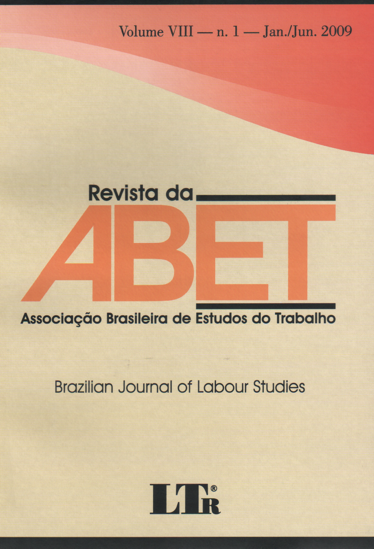Social Security and Poverty in the Rural Zone of the Brazilian Northeast (1991-2000)
Abstract
The objective of this paper is to analyze the influence of Social Security in the decrease of the poverty and concentration of income in the rural zone of the Brazilian Northeast. It is in the rural zone of the Northeast of Brazil that ponders the largest number of poor and indigent. The data shows that there is a significant difference in the poverty degree and of misery among the homes with and without retired. The impact of the social security in the family revenue was larger in 2000 than in 1991, because the revenues of the retired ones and pensioners of 2000 suffered a significantelevation. That verification allows to infer that the existence of politics of income transfer is not enough to cause a significant reduction in the poverty degree. It is necessary that the values of the transfers are significant. The first section presents the methodological approach, while the second analyzes the importance of the social welfare as an instrument of public policy of social security. The third section presents the relations between the social welfare, poverty and income concentration in the rural northeast, emphasizing the impacts of the social welfare on family income and the indicators of inequality, poverty and penury. The last section is dedicated to conclusive notes.
Downloads
Downloads
Published
How to Cite
Issue
Section
License
Política de Acesso Livre
Esta revista oferece acesso livre imediato ao seu conteúdo, seguindo o princípio de que disponibilizar gratuitamente o conhecimento científico ao público proporciona maior democratização mundial do conhecimento.
Atribuição dos artigos é não comercial (sem derivações 4.0, isto é, Creative Commons) e o acesso é livre e gratuito para download e leitura.
Não há taxa para submissão, avaliação e publicação de artigos.
Copyright
1) Os artigos são de responsabilidade exclusiva dos autores. É permitida sua reprodução, total ou parcial desde que seja citada a fonte.
2) Os trabalhos enviados para publicação devem ser inéditos, não sendo permitida sua apresentação simultânea em outro periódico nacional.
3) Os artigos são submetidos a pareceristas "ad hoc", após prévia avaliação da Comissão Editorial, os quais podem aceitar, recusar ou reapresentar o original ao autor com sugestões para alterações. Os nomes dos pareceristas permanecem em sigilo, bem como os nomes dos autores.
Os Autores que publicam nesta revista concordam com os seguintes termos:
Autores mantêm os direitos autorais e concedem à revista o direito de primeira publicação, com o trabalho simultaneamente licenciado sob a Creative Commons Attribution License, permitindo o compartilhamento do trabalho com reconhecimento da autoria do trabalho e publicação inicial nesta revista.
Autores têm autorização para assumir contratos adicionais separadamente, para distribuição não-exclusiva da versão do trabalho publicada nesta revista (ex.: publicar em repositório institucional ou como capítulo de livro), com reconhecimento de autoria e publicação inicial nesta revista.
Autores têm permissão e são estimulados a publicar e distribuir seu trabalho online (ex.: em repositórios institucionais ou na sua página pessoal), já que isso pode gerar alterações produtivas, bem como aumentar o impacto e a citação do trabalho publicado.
Patrocinador
A publicação recebe financiamento da Associação Brasileira de Estudos do Trabalho.










